×


We have detected your country as:
Please click here to go to the USA website or select another country from the dropdown list.
by: Rebecca Verbeten, Zealous8:2 Coordinator

Zealous8:2/bridgesforpeace.com
I was four years old the first time my feet walked across the polished hardwood floor of an evangelical Christian Sunday school classroom. From that point on, my life was cultivated in an environment where the ancient text, the Bible, was foundational. Because of that upbringing, I committed hundreds, possibly thousands of verses to memory. However, it was not until my early 30s, that I first understood that God still has a plan and purpose for Israel and the Jewish people.
 As we read through the Scriptures, it is plain to see that God is constantly speaking to Israel and about Israel, and He has a plan for the world which He will bring about through Israel. Why is it that my generation of Christians—as well as many before me, and certainly many after me—has largely failed to make the fundamental connection between Israel and the Jews and Christianity?
As we read through the Scriptures, it is plain to see that God is constantly speaking to Israel and about Israel, and He has a plan for the world which He will bring about through Israel. Why is it that my generation of Christians—as well as many before me, and certainly many after me—has largely failed to make the fundamental connection between Israel and the Jews and Christianity?
I believe the answer to this question can easily be found in the following passage in Deuteronomy:
“Hear, O Israel: The Lord our God, the Lord is one! You shall love the Lord your God with all your heart, with all your soul, and with all your strength. And these words which I command you today shall be in your heart. You shall teach them diligently to your children, and shall talk of them when you sit in your house, when you walk by the way, when you lie down, and when you rise up. You shall bind them as a sign on your hand, and they shall be as frontlets between your eyes. You shall write them on the doorposts of your house and on your gates” (Deut. 6:4–9).

www.iStockphoto.com
The first verse of this passage encapsulates the monotheistic essence of Judaism. The oneness of God, the echad as it is called in Hebrew, is one of the many things shared between Christianity and Judaism. From my experience in the Church, for many generations, a large number of Christians have failed to heed God’s commands in Deuteronomy 6:7–9. The call found in the Tanakh (Gen.–Mal.) to teach God’s commandments to our children was often either overlooked entirely or explained away with an abstract or spiritualized replacement teaching that said these ancient instructions have no validity for modern life.
In July of 2009, I was astonished to learn that Yeshua (Jesus) and His disciples were all Jewish, and that they lived Torah-observant lives. They kept kosher (observed Jewish dietary laws), celebrated all of the Feasts of the Lord and honored the Sabbath. I was even further aghast to learn that Yeshua did not create a new religion, but for many years His followers were considered to be a unique stream of Judaism, even as they built the foundation on which Christianity would be established. Today, many Christians view the the first two-thirds of the Bible as the “Jewish Scriptures” and consider them irrelevant for modern Bible believers. But if we see them as God-inspired instruction for our lives as did the early church, and indeed we should, how have we drifted so far from our foundation?
In AD 70, a catastrophic event took place which would change both Judaism and Christianity forever, placing a deep chasm between the two for millennia to come—the destruction of the Second Temple. This resulted in the dispersion of the Jewish people from Jerusalem and caused the Christian Church to lose one of its most important life sources—its Jewish influence. That event, along with a growing number of Gentile believers, paved the way for the Church to disconnect from its Hebraic roots and to hand down to future generations hypothetical and philosophical doctrine instead.
Although the depletion of our Jewish root has been a great loss, separation from the foundation is not something that has been isolated to Christianity. This is a devastation that took place numerous times for the ancient Israelites.
In the book of Judges we find the people of Israel without godly leadership. They faintly remembered the great miracles God had done on their behalf. The generation before them reminisced about the parting of the great sea. There were still murmurings about the ten cowardly spies, and the agonizing consequence the whole nation had to endure.
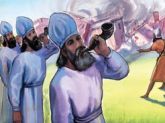
Defeat of Jericho www.TheGloryStory.com
The oldest of their generation spoke of their fervent hope for the Land God promised to their forefathers—the Land in which they now walked. Fresh fire ignited in their eyes when they told of the mighty conquest of Jericho—the marching, the silence, the trumpets, the shouting and then the walls crumbling. There were stories of great victories, the death of kings, bloodshed, hailstones from heaven, and the sun standing still. But the Land was divided and the tribes were separated as they covered the Land from north to south. In time, the elders who remembered were gathered to their ancestors.
“The people served the Lord all the days of Joshua, and all the days of the elders who outlived Joshua, who had seen all the great works of the Lord which He had done for Israel” (Judg. 2:7). Joshua died at one hundred and ten years old and “When all that generation had been gathered to their fathers, another generation arose after them who did not know the Lord nor the work which He had done for Israel” (Judg. 2:10). This set the nation down a path in which it was repeatedly said of them “and the children of Israel did evil in the sight of the Lord.”
How could the fathers have witnessed wonders with their own eyes, and yet failed to instill in their sons and daughters love for the One who had crafted such wonders? Again, we need not look too far to find the answers.
In the book of Deuteronomy, we find the nation of Israel positioned at the entrance to Canaan. Here, Moses seized one last opportunity to prepare the people for their new life. In the midst of one of his parting speeches he urged them, “Therefore you shall love the Lord your God, and keep His charge, His statutes, His judgments, and His commandments always. Know today that I do not speak with your children, who have not known and who have not seen the chastening of the Lord your God, His greatness and His mighty hand and His outstretched arm…but your eyes have seen every great act of the Lord which He did” (Deut. 11:1–2, 7).
 Those who had beheld the miracles of God were instructed and entrusted to keep every commandment, to love and serve God with all of their heart and soul, and to walk before the generations that followed as a sign of the one, true, living God.
Those who had beheld the miracles of God were instructed and entrusted to keep every commandment, to love and serve God with all of their heart and soul, and to walk before the generations that followed as a sign of the one, true, living God.
So, how did the nation get to the point where “the children of Israel did evil in the sight of the Lord?” The distractions and pull of the nations surrounding them, with their idol worship and vile lifestyles, were powerful enough that a people who were commanded to “remember” simply forgot.
When Israel forgot the Lord their God, they served false gods, and the anger of the Lord burned against them. In His anger, God delivered them into the hands of their enemies, leaving the Israelites to serve foreign nations. Yet each time the children of Israel cried out to the Lord, the Lord raised up a deliverer for them. Many generations came and passed, and with them the Israelites experienced a constant “tug-of-war” as, at times, they chose to worship the God of their fathers and at other times, the gods of the surrounding nations.
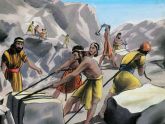
Building the Temple during King Solomon’s reign www.TheGloryStory.com
For 611 years after the death of Joshua, the children of Israel were governed by judges, prophets and kings. In their wickedness, and out of a desire to become like the surrounding nations, they rejected God as their King, insisting on a man to rule over them as king. These 611 years brought times of prosperity and times of defeat. The people saw the victories of their beloved King David and the historic completion of the Temple under the reign of King Solomon. Some of their kings were righteous and some were evil. During the times of the evil kings, God was faithful to send prophets to speak His words of judgment. Throughout these generations, however, there was not a time when the covenant of the Lord was heeded in its entirety (2 Kings 23:25).

Martin Luther
For the Church, just as for ancient Israel, the result has been tragic. Forgetting to remember resulted in an almost complete rejection of the Church’s Jewish roots. This led to many of the Church’s darkest hours in history including the writing of Jewish hate documents by some early fathers of Christianity, such as John Chrysostom, Saint Jerome, and even the highly revered Martin Luther. Their writings sparked persecutions, Crusades, and pogroms against the Jewish people. Such writings, teachings and horrific occurrences paved the way for the absolute darkest hour in all of humanity—the Holocaust.

Fence at Auschwitz Tischenko Irina/shutterstock.com
Today most Christians would be appalled by the mere suggestion that we should hate and persecute the Jewish people. Many are completely in awe to learn that the Holocaust is known worldwide as a Christian assault against the Jews. So, are we really that disconnected from the root?
Although great strides have been made, we are still living in the shadow of our forefathers. Many in the Church have been taught to spiritualize Israel and the Jewish people or to ignore them altogether. Pastors, youth pastors, and even Bible college professors still teach that the Church has replaced Israel and that the promises and covenants God made to the Jewish people now belong to the Church. We are also in the midst of a generation who may not have been told these things directly, but hold them at the core of their beliefs because of the underpinnings of the teachings they have received. Numerous Christian leaders even appear to have dismissed completely the teaching of the Apostle Paul found in Romans 11:1–2 which says, “I say then, has God cast away His people? Certainly not! For I also am an Israelite, of the seed of Abraham, of the tribe of Benjamin. God has not cast away His people whom He foreknew.”
My husband and I spent four years traveling across the United States teaching young people in different Christian settings about the Jewish roots of Christianity. We opened up the Bible with them and pointed out Scriptures that made it obvious that God is not finished with the Jewish people and that we, as Christians, have a responsibility to adhere to that truth. Time after time we received the same response and the same question. I call this occurrence an “Aha!” moment. Stunned faces of young people, raised in the Church, and trained for Christian service asked, “Why wasn’t I taught this before?”
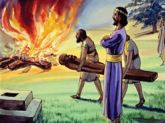
Burning idols during the reign of King Josiah www.TheGloryStory.com
In the year 634 BC something astounding took place in Israel when a child-king named Josiah came into power. The Bible tells us in 2 Kings 22:2 that King Josiah did what was right in the sight of the Lord, and walked in all the ways of his father, David.
When King Josiah was 18 years old, the high priest found the Torah (Gen.–Deut.) in the house of the Lord. After hearing the words of the Torah, in deep anguish the King tore his clothes and gathered to himself the priests, prophets and all the people of the Land and read, in their presence, all the words of the Book of the Covenant.
I recently watched a video on YouTube titled the “Josiah Generation.” For 3 minutes and 12 seconds, six young people passionately spoke of King Josiah as a “game changer.” They spoke of the corruption in the Temple during his time and of the anger that burned within him because of it. And then they made the following statements:
“Josiah was known for establishing something new.”
“ Josiah was known for setting a new standard, a new expectation.”
“ He defined the true heart of worship.”
After spending 12 years training young adults for Christian ministry, I have to admit that for a few seconds I wanted to stand to my feet and applaud the fervor for holiness I saw in each of these young people. I once believed passionate statements like these would serve to fuel a generation that would transform the Church. And there are groups of Christian young people around the world being trained with just as much passion to uphold Josiah’s “new” standard.
The truth, however, is that Josiah did not establish anything new. He did not set a new standard. He did not define the true heart of worship. What did he really do?

www.iStock.com
He stood in the presence of his people and made a covenant before the Lord to keep His ancient commandments and testimonies. And all the people with him also took a stand on this ancient covenant.
He did something very unconventional by today’s modern Church growth and young adult ministries planning standards. He uttered forth a call to return to the ancient ways, reestablishing the ancient rituals commanded by God to the children of Israel.
In a day and age when many experts in reaching the millennials of the evangelical Church seem to be reinventing new tactics, referring to self-help books and delivering motivational speeches, we need not look any further than to the ancient text itself and the covenant made by a young adult king. Of Josiah it was said, “Before him there was no king like him, who turned to the Lord with all his heart and with all his soul and with all his might, according to all the Law of Moses, nor did any like him arise after him”(2 Kings 23:25).
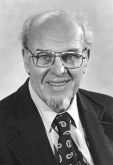
Dr. G. Douglas Young
God always secures a remnant and I want to be sure to give honor where honor is due by commemorating two revolutionaries who went against the grain of teaching in their day. First, Dr. G. Douglas Young began the Institute of Holy Land Studies in Jerusalem in 1958 and moved to Israel in 1964. He was an educator and a scholar who was influenced by his parents, and by a pro-Israel seminary, to love the Hebrew language and Israel, the land of the Bible. Because of that love and a desire to teach young adults going into Christian service about God’s heart, covenant and plans for Israel, Dr. Young taught young people the Hebrew language and the Bible using the land of Israel as their classroom.
In November, we celebrated the 50-year anniversary of Dr. Young’s work in Jerusalem, which paved the way for Bridges for Peace. This organization, which is highly influential in repairing and building Jewish and Christian relationships and educating the Church about our Jewish roots, was begun by a man who believed firmly in training up the next generation to know the truth concerning Israel and the Jewish people. Please join us in giving thanks to God for Dr. Young’s obedience to the Lord.
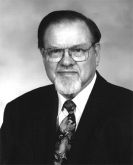
Dr. David Allen Lewis
Although in the 1960s and 70s there weren’t as many Christian supporters of Israel as there are today, Dr. Young was not entirely alone. At the same time an American evangelist by the name of Dr. David Allen Lewis was traveling across the US with his wife and young family, delivering the message of God’s promises to Israel from pulpits nationwide. Throughout his lifetime he did much to pioneer and strengthen relationships between Jews and Christians. He was blessed to meet with US presidents, Israeli prime ministers, and others of great influence, all the while serving as a voice for solidarity and blessing.
His life and ministry continue to bear much fruit. He is the father of the Bridges for Peace CEO, Rebecca Lewis Brimmer who continues to carry the message she was privileged to hear countless times as a child and young girl. Dr. Lewis also founded Christians United for Israel (CUFI), which continues to connect millions of Christians around the world to Israel. I was blessed and amazed as I traveled across the US to meet so many people whose lives were impacted by Dr. Lewis, resulting in their deep love for Israel. Seven years after his passing, his life continues to speak volumes.
I believe we are close to bridging the gap in Jewish–Christian relationships and learning from the ancient ways instituted by God. More than ever before, I sense a hunger for truth and holiness in today’s young adults.
The prophet Joel said that there was coming a day when God would pour out His Spirit on all flesh. Our sons and daughters would prophecy and our young men would see visions (Joel 2: 28–29). I believe we are standing on the cusp of that day.
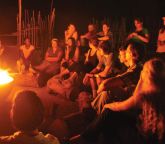
Zealous8:2 participants on tour to Israel Zealous8:2/bridgesforpeace.com
An army is massing together—an army of young people empowered by the Holy Spirit and armed with sound, biblical teaching who will make a bold stand in the face of adversity. This army will be equipped to engage in the battle of words for the hearts and minds of their generation regarding Israel and the Jewish people. This army will usher in a complete shift in the teaching coming forth from churches, small groups and seminaries worldwide. This army is taking its place because the generations before them are imparting the truth, the whole truth, and nothing but the truth. Like God Himself, this army will be “Zealous for Zion with great zeal. With great fervor [they will be] zealous for her” (Zech. 8:2).

Young adults touring with Zealous8:2 Zealous8:2/bridgesforpeace.com
In response, I urge you to do two things. First, pray. Pray that Truth will penetrate the hearts of this generation of young adults; that it will become their “norm” in the Church to stand with and bless Israel. And second, do not hold back your own influence. Observe those with whom God has surrounded your life, both young and old, and be a living example of loving, honoring and clinging onto the whole Truth found in God’s Word.
Brimmer, Rebecca J. and Bridges for Peace Leaders. Israel and the Church;
God’s Roadmap. Jerusalem: Bridges for Peace, 2006.
Josephus. Antiquities of the Jews. United Kingdom: Acheron Press,2012.
Solberg, Dr. Jim. “Heresies, Hurts and Holocaust.
” https://www.bridgesforpeace.com/il/teaching-letter/article/heresies-hurts-and-holocaust
Sprinkle, Charleeda. “A Tribute to BFP’s Founder.” Dispatch from Jerusalem,
Vol. 37 Issue 1 (February 2012),
https://www.bridgesforpeace.com/il/dispatch/article/a-tribute-to-bfps-founder
All logos and trademarks in this site are property of their respective owner. All other materials are property of Bridges for Peace. Copyright © 2025.
Website Site Design by J-Town Internet Services Ltd. - Based in Jerusalem and Serving the World.